|
2007 marks thirty years since the introduction
of the Ruger Red label shotgun. Introduced in 1977, it
has been in constant production since 1978, which is stating a
lot for an American maker of over/under double shotguns. It
seems that most American double gun makers keep changing designs
every few years, due to limited success in the market competing
against foreign gun makers for the over/under shotgunner‘s
affection. Still through all this time, the Red Label keeps on
selling to a market of buyers who want a good, durable, and
well-crafted over/under shotgun.
The Red Label design is, to my eyes, one of the
most pleasingly elegant shotguns in existence. Its clean lines
are entirely devoid of any pins or screws on the exterior of the
shotgun. The Red Label has that classic look of a hunter’s
arm, of a shotgun carried afield behind a good dog on a
crisp Autumn afternoon in pursuit of quail. The gun carries
well, and points naturally. It also opens easily. I like that
feature on the Ruger. Shooters who do not understand the design
think that it is built too loosely. That just ain’t so. They
are accustomed to buying a new Italian or Japanese gun and
having to open it using both hands and one knee. The design of
the Red Label locks it up as tightly as any double made, but
upon opening, the mono block is eased forward ever so slightly,
allowing the gun to almost fall open. It is an ingenious and
elegant design, and in my opinion, the best on the market in
that regard. The Red Label also has mechanical sears, meaning
that the second barrel fired does not depend upon the recoil
from the first to set it to fire. If you get a dud shell in the
first barrel, the second will fire immediately upon pulling the
trigger again. That is a good feature.
It has been almost three years since I last
reviewed a Ruger Red Label. It was a twelve
gauge Real Tree camo model, and it turned out to be an
ideal turkey gun.
The Red Label reviewed here is a wood-stocked
twenty gauge with the straight-gripped English stock, and is one
of the best upland bird guns available today. With its
twenty-eight inch barrels, it weighs in at seven pounds, three
ounces, and swings beautifully. Sometimes hunters look for less
weight in an upland bird gun, but reducing weight too much
results in a gun that does not swing well, with a whippy
feeling, much like trying to smoothly swing a broomstick. I like
a twenty gauge to weigh between six and one-half and seven and
one-half pounds, depending upon the barrel length and density of
the wood. Going lighter than that is counterproductive in a bird
gun. It is much better to loose five pounds off the hunter’s
belly than to try and shave a pound off of a well-balanced seven
pound gun.
On the other end of the weight argument, some
critics state that the Red Label is not heavy enough to be a
dedicated target gun. I don’t see it that way. For clay
targets, I like a gun that swings just like a bird gun, with
enough weight for a good follow-through, but without being
excessively heavy. Ruger designed the Red Label to be a
top-notch field gun, but it also serves very well as a clay
target gun, if it fits the shooter well, which is an important
point with any clay target or bird gun. While on the
subject of target guns, Ruger will deactivate the automatic
safety for a small charge if the owner so desires, as do many
clay target shooters.
The test gun wore some very good walnut, with
enough figure to make it interesting, and hand cut checkering on
the wrist and forearm area. The wood to metal fit was very good,
and the blued finish of the barrels contrasts nicely with the
smooth stainless receiver. I really like the looks of the smooth
receiver. Some makers have machine engraving on the receiver,
and it is an option on the Red Label. It works well if it is
done properly, but otherwise it detracts from the elegance of a
good double. I like the plain look best. If a shotgun is
beautiful, it needs no ornamental dressing applied. The
buttstock is supplied with a charcoal gray solid recoil pad,
which works very well to keep the buttstock in place on the
shooter’s shoulder.
The Red Label is a single trigger design, and
the barrel selector is integral with the thumb safety, pushing
it to either side to select which barrel fires first, and
forward to fire the weapon. The forearm has a well-inletted
latch, making the takedown of the shotgun easy without any tools
needed. The Red Label comes supplied with five thin-wall Briley
choke tubes, and an excellent tube wrench. The chokes are
marked full, modified, improved cylinder, and skeet, with two of
the latter provided.
The Red Label has filler strips on either side,
closing the area between the barrels. These strips are removable
if the shooter so desires, to change either the cosmetics or
slightly alter the balance of the shotgun. I believe that
I prefer the open look with the ribs removed, but that is just a
personal thing.
Another great feature of the Red Labels is that
they are size-matched to the gauge of the shell. Ruger offers
three sizes, with the twelve gauge being the largest, and the
twenty-eight gauge being the sweetest little darling of an
over/under shotgun that I have ever held. The twenty gauge is,
however, my favorite for a field or clay target gun. It offers
the best balance of power and size that I prefer. Contrary to
popular belief, a twenty gauge shotgun will kill a pheasant just
as dead as will a twelve gauge. A bird is killed with just a few
pellets of shot, and the twenty throws them just as hard and
fast as does a twelve, it just doesn’t throw as many of them.
If your pattern is well-centered, the bird will never know the
difference.
Another nice feature of the Red Label is that it
comes with Ruger’s famous customer service. With any
maker, you are sometimes going to have parts break.; that is
just a mechanical fact. If you have a problem with some of the
more popular Italian shotguns, good luck in getting any
satisfaction from the factory warranty. If your Ruger
breaks, Ruger will fix it. That gives me a lot of confidence
when buying a product; any product. The way in which a
company treats its customers after the sale means a lot to me,
as it should to each of us. Ruger has a reputation for
customer service that is one of the best in the industry.
Shooting this latest Red Label held no
surprises, as the gun functioned perfectly, efficiently fully
ejecting every fired shell and extracting slightly for an easy
grip on the unfired shells. The gun patterned well, and
changing chokes was a quick and easy operation. The trigger pull
measured an average of five pounds, two ounces, and varied very
little between shots. The automatic safety worked as
designed, every time. There were no failures of any kind during
testing.
In the title of this piece, I refer to the Red
Label as "America’s Over/Under Shotgun", and
that statement is likely to draw some criticism and a few nasty
emails, but I stand by it. It seems that some over/under shotgun
makers change their design about as often as a baby’s diaper,
and for much the same reason. It is expensive to build a
quality double shotgun, and most American makers have all but
given up on building one here, but the Red Label has endured
against a barrage of imported competitors. It is true that the
Ruger is not the ideal end-all to every shotgunner’s needs, as
shotgunners are about as finicky as the proverbial Beverly Hills
housecat, but for the majority of American hunters and target
shooters, the Red Label has served well in the past and will
continue to serve quite well for several more decades. It
is rugged, reliable, well-balanced, elegant, and affordable. It
is America’s Over/Under Shotgun.
Check out the full line of Ruger products
here.
For the location of a Ruger dealer near you,
click on the DEALER LOCATOR icon at: www.lipseys.com.
Jeff Quinn
|
To locate a dealer where you can
buy this gun, Click on the DEALER FINDER icon at: |
|

|
  
Got something to say about this article? Want to agree (or
disagree) with it? Click the following link to go to the GUNBlast Feedback Page.
|
|
Click pictures for a larger version.
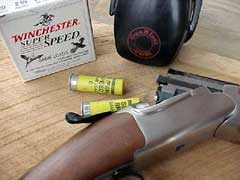
Ruger's Red Label: America's over/under shotgun.
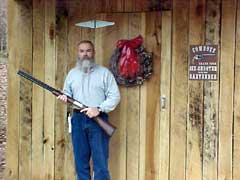
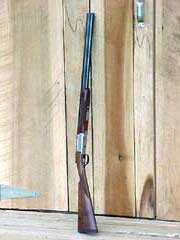
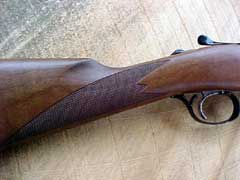
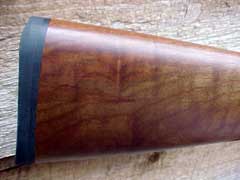
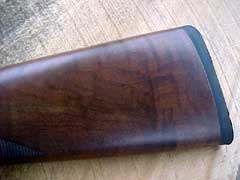

The English-style buttstock is well-figured,
well-finished, hand-checkered, and perfectly shaped.
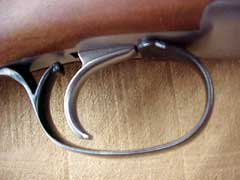
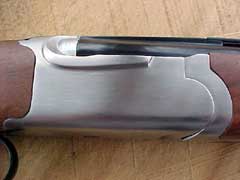
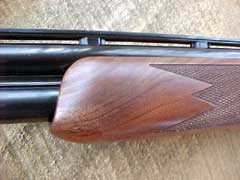
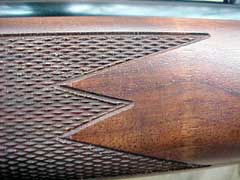
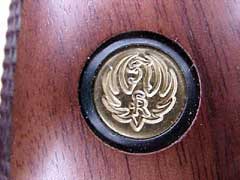
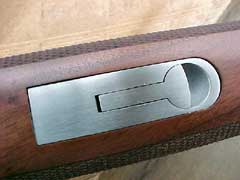
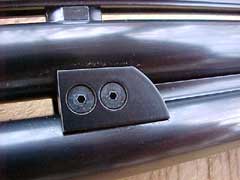
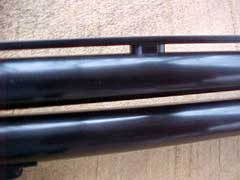
Side filler strips are removable for aesthetics or
balance adjustment.
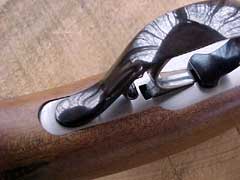
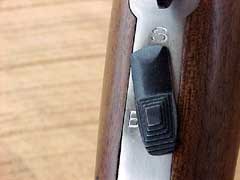
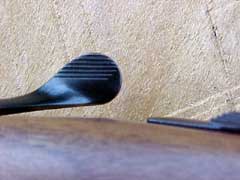
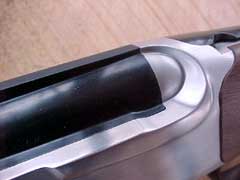
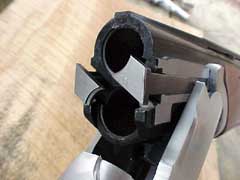
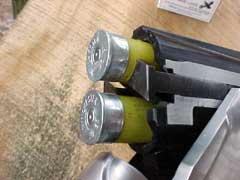
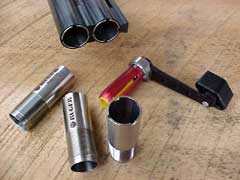
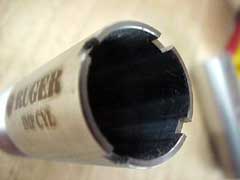
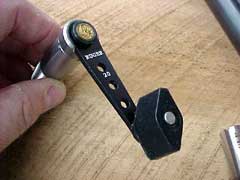
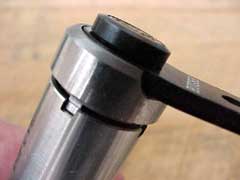
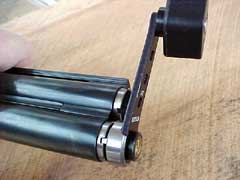
The Red Label comes supplied with five thin-wall Briley
choke tubes, and an excellent tube wrench.
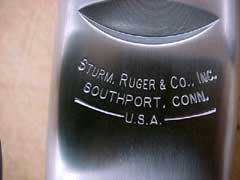
|
![]()